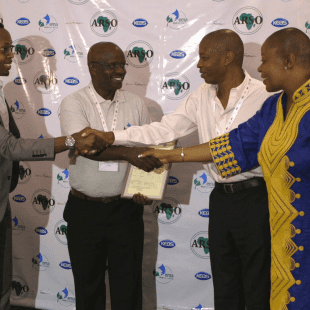Africa’s first certified fish farm with EcoMark Africa label
Kamuthanga fish farm has become the first to receive the EcoMark Africa label by the African Organisation for Standardisation (ARSO). This tilapia-producing fish farm in Machakos, Kenya, developed by the FoodTechAfrica team, has been awarded the EMA certificate at the platinum level, the highest of 4 certification levels. A solid reflection of how the tilapia produced at the farm for the Kenyan market is sustainable, incorporating key social and environmental aspects in the production processes.
EcoMark Africa (EMA) label
The African Organization for Standardization (ARSO) has launched EcoMark Africa (EMA) as a continental certification system, designed to enhance access for African products to international markets. EMA is comparable to the requirements of the global ASC certification scheme. EMA’s overall aim is to contribute to a global shift towards sustainable consumption and production and thus enhance Africa’s ability to achieve the Sustainable Development Goals. With regard to aquaculture, the EMA label aims to reduce the impact of fish farming on the environment; it contains standards regarding medicine use, sustainable fish feed and good working conditions for staff.
ARSO Certification event
The certification ARSO event took place at the Sarova Stanley hotel in Nairobi, Kenya, on the 8th of March 2019 and was attended by ARSO President, Dr. Eve Gadzikwa and the Secretary General, Dr. Hermogene Nsengimana. Kamuthantha Farm Owner Anthony Ndeto shared his lessons learned of becoming a certified fish farm in the panel discussion.
Watch the movie about the ARSO Certification event (4 minutes):
Kamuthanga farm
After preparing and training the farm’s management and employees in order to meet the 200 EMA bullet point standards, FoodTechAfrica and the auditing team went through all the operational, environmental, social and economic aspects of the fish farm, able to produce up to 100 tons of fresh tilapia per year. The quality assurance team of Kamuthanga showed the auditing team how all aspects of the EMA standard are monitored and secured. Not only were standard requirements for the environment met, all staff members benefit from the implementation of health & safety standards and improved employment conditions.
The following principles were certified by the ARSO audition team.
- Legal compliance. Respected applicable laws and regulations.
- Land and water use. Farm located, designed, constructed and managed to avoid their negative impacts on other users and the environment.
- Water pollution and waste management. Minimized the negative impact of fish farming on water and land resources.
- Genetics. Minimized impacts of aquaculture on the genetic integrity of local Africa fish populations.
- Feed management. Used feed and feeding practices that ensure that feed inputs are sustainable and minimized.
- Health management, veterinary medicines and chemicals. Minimized ecosystem and human health impacts, while maximizing fish health, welfare and ensuring food safety.
- Social responsibility and user conflict. Developed and operate farms in a socially responsible manner that contributes effectively to community development and poverty alleviation.
FoodTechAfrica’s journey
FoodTechAfrica is a consortium of private and public partners. The activities started in 2011 when a Kenyan farmer explained he was unable to make fish farming profitable for himself, and other farmers around him. He explained little fish was available on the local market. A surprise, as Kenya, borders Lake Victoria which has been a source of fish for the region for centuries. However, lake Victoria’s output is declining sharply due to pollution, overfishing, and lack of regulation. The declining output is traditionally replaced by the import of fish. But Kenya and East Africa as a whole have excellent capabilities to produce local fish, for the local market. It just had not been done at scale.
FoodTechAfrica set up to tackle the key challenges hindering the development of the sector:
- Improving the local production of high-quality aquaculture inputs, including extruded floating fish feeds, fingerlings and equipment.
- Enhancing the technical and management capabilities of fish producers, increasing both the efficiency and the output of farming.
- Introducing innovative yet localized solutions for fish farming, including sustainable RAS technology drastically increasing output and reducing the need for water usage.
- Building partnerships with both private and public sector with a concrete output.
Together with FoodTechAfrica partners including Best Fresh Fish, Fishion, Holland Aqua, Lattice Consulting, Larive International, Skretting, Unga and Viqon Water Solutions and support from the Ministry of Foreign Affairs of the Netherlands and the Embassy of the Kingdom of the Netherlands in Nairobi, this incredible result is another concrete step in empowering aquaculture in Africa.
The road ahead
FoodTechAfrica will continue and expand her activities to develop the aquaculture value chain in East Africa. Want to know more about FoodTechAfrica’s story and future plans? Please contact Wouter van Vliet or Bart Malaba.




